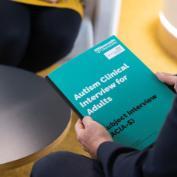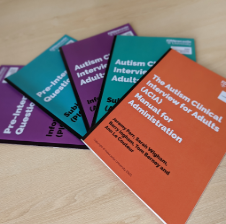Autism Clinical Interview Adults Training (ACIA)
A short training course enabling delegates to be trained to use the Autism Clinical Interview for Adults (ACIA) - a diagnostic assessment for people age 16+ that can be used in clinical services or research.

Delegates will receive training in use and administration, a copy of the manual and ACIA Subject and Informant booklets.
Following training delegates will be able to use the ACIA in their diagnostic practice and/or research.

Course Description
ACIA training has been kept low cost to maximise opportunities for uptake; funds from training are reinvested in further ACIA development.
Following training, PDF copies of the ACIA documents will be provided to delegates free of charge (including the ACIA Manual, Pre-Interview Questionnaires and the ACIA Subject and Informant versions of the main interview).
The PDF and the paper copies provided should be used to create colour printed versions or colour photocopies of the ACIA materials for personal use in your diagnostic service. We make no charge for ACIA use. Your clinical service should pay for local printing/copying. Versions you print or copy should be exact copies - delegates are not permitted to edit or change the ACIA.

If required printed versions can be provided by us at additional cost (please contact ACIAtraining@ncl.ac.uk regarding costs).
Venue Details
Courses are based entirely online.
Book a place on the course
Please click below to book your place
Translation
We are interested in the ACIA being translated into languages other than English, so that the materials are made widely available to support the assessment of adults with possible autism. The ACIA has been translated into:
- German
- Polish
- Welsh
If you would like to translate the ACIA into the official spoken and written language of your country, there are requirements for working with us.
Translation
We are interested in training others to deliver ACIA training, so that the materials are made widely available to support the assessment of adults with possible autism. If you would like to become an ACIA trainer, there are requirements for working with us.
Contact Information
If you have any questions about the ACIA, training, translation, or becoming a trainer, you can contact the organisers via email at: ACIAtraining@ncl.ac.uk
Relevant publications
- Wigham, S., Welsh, P., Ingham, B., Wilson, C., Fisher-Rogers, A., Lees, R., McConnell, O., Nedyalkova, A., Nicholson, L., Le Couteur, A. and Parr, J.R., 2024. Post-Autism Diagnosis Support for Adults in the United Kingdom: Positive and Negative Experiences and Proposed Solutions to Address Gaps in Service Provision. Autism in Adulthood.
- Wigham, S., Ingham, B., Le Couteur, A., Wilson, C., Ensum, I., & Parr, J. R. (2023). Autism, 27(2), 344-355. Consensus statements on optimal adult post-diagnostic support and services: Delphi process following a UK survey of autistic adults, relatives and clinicians.
- Wigham, S., Ingham, B., Le Couteur, A., Wilson, C., Ensum, I., & Parr, J. R. (2022). Autism, 26(8), 1959-1972 A survey of autistic adults, relatives and clinical teams in the United Kingdom: And Delphi process consensus statements on optimal autism diagnostic assessment for adults.
- Rodgers, J., Farquhar, K., Mason, D., Brice, S., Wigham, S., Ingham, B., Freeston, M. & Parr, J. R. (2020). Development and initial evaluation of the anxiety scale for autism-adults. Autism in Adulthood, 2(1), 24-33.
- Wigham, S., Ingham, B., Le Couteur, A., Berney, T., Ensum, I., & Parr, J. R. (2020). Development and Initial Utility of the Autism Clinical Interview for Adults: A New Adult Autism Diagnostic Measure. Autism in Adulthood, 2(1), 42–47.
- Wigham, S., Rodgers, J., Berney, T., Le Couteur, A., Ingham, B., & Parr, J. R. (2019). Psychometric properties of questionnaires and diagnostic measures for autism spectrum disorders in adults: A systematic review. Autism, 23(2), 287–305.
- Wigham, S., Hatton, C. and Taylor, J.L., 2011. The Lancaster and Northgate Trauma Scales (LANTS): The development and psychometric properties of a measure of trauma for people with mild to moderate intellectual disabilities. Research in developmental disabilities, 32(6), pp.2651-2659.

